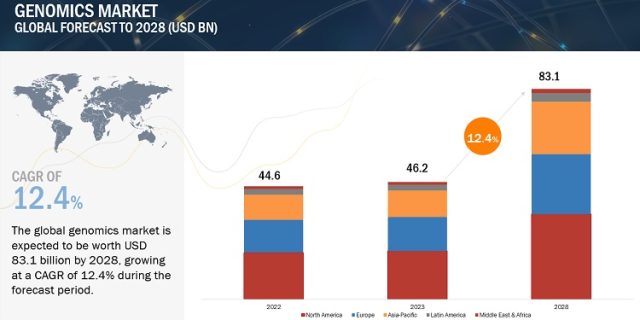
The global genomics market has been segmented into North America, Europe, Asia Pacific, Latin America, and the Middle East and Africa. In 2022, North America accounted for the largest market share, followed by Europe and the Asia Pacific. The large share of North America can primarily be attributed to the increasing research funding and government initiatives for promoting precision medicine and the presence of prominent players in the US.
The global genomics market in terms of revenue was estimated to be worth $46.2 billion in 2023 and is poised to reach $83.1 billion by 2028, growing at a CAGR of 12.4% from 2023 to 2028.
Download PDF Brochure: –https://www.marketsandmarkets.com/pdfdownloadNew.asp?id=613
North America accounted for the largest share of the genomics market in 2022. Favorable initiatives by government and private bodies for the development and adoption of genomics, wide adoption of NGS and PCR-based diagnostics in the region, an increasing number of genomics startups in the region, growing research on cancer, rising awareness of genomics services, and the presence of prominent players in the genomics market, such as Illumina, Inc. (US), Thermo Fisher Scientific, Inc. (US), and Danaher Corporation (US), are driving the growth of the genomics market in North America.
US dominates North American genomics market.
In the past two decades, genomics has evolved as a scientific research discipline. Fueled by grants and funds from government institutes, the genomics market has witnessed tremendous changes on the technological front. Government institutes such as the Centers for Disease Control and Prevention (CDC), the National Institutes of Health (NIH), and the National Human Genome Research Institute (NHGRI) have provided funds and grants to support research in the genomics field. Recent developments in this regard have been listed below:
- In September 2022, the Centers for Disease Control and Prevention (CDC) announced five-year funding of USD 90 million for the purpose of fostering and improving innovation and technical capacity in pathogen genomics.
- In August 2022, the Medical Device Innovation Consortium (MIDC) launched the Somatic Reference Samples (SRS) Initiative to improve the accuracy of NGS-based cancer diagnostics. MIDC will lead the collaboration with the SFDA, the National Institute of Standards and Technology (NIST), and the National Institutes of Health (NIH) to manufacture, validate, and distribute SRS to simplify and support the validation of NGS technology for cancer diagnostics.
- The National Institutes of Health (NIH) initiated the All of Us Research Program to sequence the genomes of over one million people living in the US. The program is a key component of the Precision Medicine Initiative, which began national enrollment in 2018 and is expected to last at least 10 years till 2028.
- The NIH’s All of Us Research Program provided funding of USD 28.6 million to establish three genomic centers in the US to accelerate precision medicine discoveries.
Key players in the genomics market are adopting several strategies for developing advanced products and providing efficient genomics solutions to their customers. For instance,
- In August 2022, OpGen, a US-based molecular microbiology solutions provider, launched an NGS-based service to support public health. The service is aimed at clinical microbiologists and specialists in public health and infection prevention and control. The vision behind this service is to support the need for surveillance, infection prevention, and antibiotic stewardship.
- In March 2022, Aadi Bioscience (US) collaborated with multiple genomic testing companies, including Foundation Medicine (US) and Tempus (US), to accelerate the identification of advanced cancer patients with Tuberous Sclerosis Complex 1 and 2 (TSC1 and TSC2) inactivating alterations.
- In January 2022, New England Biolabs (US) partnered with Singular Genomics Systems (US) to validate its NEBNext kits, a product line for both DNA and RNA sample prep, with the G4 sequencing platform. NEBNext kits are designed and quality controlled to improve yields and library diversity, using a broad range of input amounts from a wide variety of sample types.
- In June 2021, QIAGEN (Germany) partnered with Verogen (US) to deliver innovative solutions for human identification laboratories. The partnership will provide laboratories with superior tools and comprehensive support for implementing NGS human identification workflows.
- In 2021, Illumina (US) collaborated with Helix (US) to improve the national surveillance infrastructure in the US to track the emergence and prevalence of novel strains of SARS-CoV-2 with support from the CDC. Illumina’s sequencing technology and expertise and Helix’s national COVID-19 testing footprint will significantly expand the country’s existing surveillance efforts to detect and characterize emerging variants of SARS-CoV-2.
Inquiry Before Buying: –https://www.marketsandmarkets.com/Enquiry_Before_BuyingNew.asp?id=613
The US is a well-developed market for genome analysis techniques that are primarily used in clinical applications by healthcare professionals (such as pathogen detection, disease diagnosis, and DNA identification) and research applications by life science researchers (such as genomics and molecular research). Growing funding to support precision medicine and the increasing adoption of several strategies by key players are expected to drive the genomics market in the US.
Top Key Players:
Key players in the genomics Market include Illumina, Inc. (US), Thermo Fisher Scientific, Inc. (US), Danaher Corporation (US), Agilent Technologies, Inc. (US), and PerkinElmer Inc. (US),

